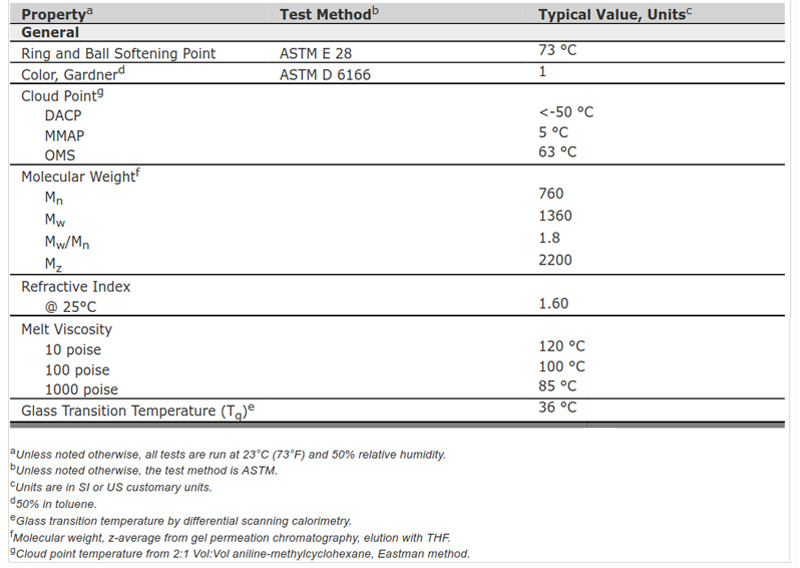
Piccolastic A75
- Technical Data Sheet Piccolastic™ A75 Hydrocarbon ResinApplicatio···
Technical Data Sheet Piccolastic™ A75 Hydrocarbon Resin
Applications
Adhesives/sealants-b&c
Bookbinding
Carpet construction
Case & carton sealing closings
Casting wax
Commerical printing inks
Concrete
Film modification
Labels non food contact
Marine
Packaging components non food contact Packaging tape
Paper chemicals
Polymer modification
Protective coatings
Roofing
Specialty tape
Tape non food contact
Tires
Key Attributes
Light color
Made from pure styrenic monomer
Product Description
Piccolastic™ A75 hydrocarbon resin is a low molecular weight, light colored, polar, hydrocarbon resin derived from pure styrene monomer. Indicated for use in adhesives, coatings, plastics modification and rubber compounding, particularly as primary plasticizers and softeners. Piccolastic™ A75 can be used as a modifier for rubber and plastic compounds used in shoe construction and as a binder for xerographic toners. In styrenic block copolymer-based systems Piccolastic™ A75 associates strongly with the styrene endblocks, reducing melt viscosity and cohesion without greatly affecting tack and adhesion properties. Piccolastic™ A75 is compatible with EVA grades with up to 20% vinyl acetate and will improve low temperature flexibility and reduce the melt viscosity of the system. Piccolastic™ A75 complies with many FDA regulations for applications involving direct contact with food. Compliance with a given regulation in a specific situation should be verified prior to use in a food contacting application.
Typical Properties

Compatibility and Solubility
Compatible with a wide variety of paraffin and microcrystalline waxes, alkyd resins, drying oils, epoxy resins, rosin and modified rosins, rosin esters, and vinyl resins, non-migrating where compatible. Soluble in aromatic, aliphatic, and chlorinated hydrocarbons; ketones; pyridine; carbon bisulfide; ethyl and butyl acetates; and turpentine. Insoluble in alcohols and glycols. Compatible at all ratios, or in limited but practically useful proportions, with a wide variety of materials, including SBR and SBR block copolymers; neoprene, nitrile, polybutadiene, and acrylic polymers; chlorinated rubber; EVA resins (ethylene-vinyl acetate copolymers); styrenated, vinylated, and drying oil alkyds; rosin resins; and EHEC (ethyl-hydroxy-ethylcellulose). Soluble in aliphatic, aromatic, and chlorinated hydrocarbons; esters; and ketones. Insoluble in alcohols and glycols. For low or zero VOC systems Piccolastic™ A75 is soluble in the VOC exempt solvents t-butyl acetate and perchlorobenzenetetrafluoride (PCBTF) and will tolerate some acetone and/or methyl acetate as a diluent in solvent systems based on TBA and/or PCBTF. VOC exemptions and environmental regulations vary regionally and compliance with local standards should be verified before any claims about VOC content are made.
Packaging
Solid, in light-gauge metal drums (400 lbs, 182 kg, net wt) or multi-wall paper bags (50 lbs, 22. 7 kg net wt).
Storage
Due to the thermoplastic behavior, pastillated and flaked resins may fuse, block or lump. This can be accelerated under any of the following conditions: 1) above ambient temperature, 2) prolonged storage, 3) pressure, e.g., stacking pallets, or a combination of these conditions. This is particularly applicable for low softening point resin grades.
In order to maintain the flake or pastille shape, we therefore recommend storing the material in a temperature-controlled area, be careful with stacking material or applying pressure and preventing prolonged storage.
It should be noted that lumping does not have a negative impact on the product specifications. Due to the nature of the product, claims regarding lumping cannot be accepted.
Resins are prone to gradual oxidation, some more so than others. This could result in darkening and/or it could have an adverse effect on the solubility of the resin in organic solvents or on its compatibility with polymers. Accordingly, it is recommended that strict control of inventory be observed at all times, taking care that the oldest material is used first.



 精细化学品
精细化学品



